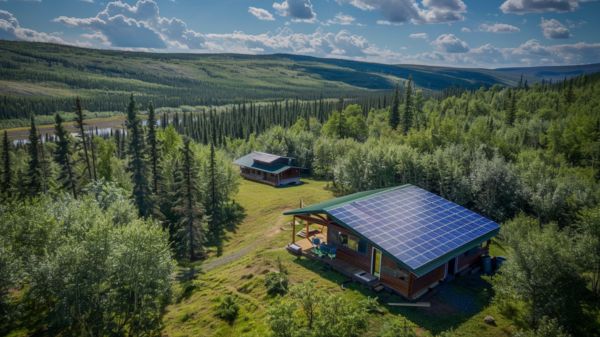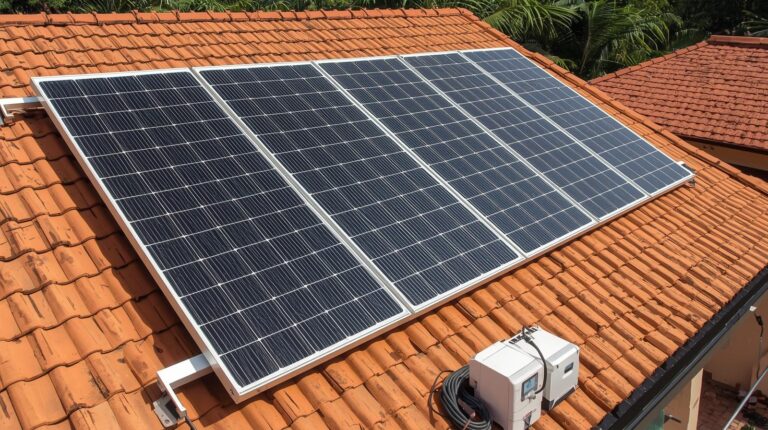Off-grid solar systems entail drawbacks such as high initial expenses for equipment and installation, limited energy storage leading to reliability issues, demanding maintenance requirements, dependency on weather conditions causing inconsistent energy generation, system complexity needing technical expertise, reliability concerns, substantial upfront investments, and regulatory obstacles.
Addressing these challenges requires careful financial planning, efficient storage management, regular maintenance, and maneuvering through complex regulatory landscapes. By understanding these disadvantages, you can prepare to make informed decisions and optimize the performance of your off-grid solar system for sustainable and reliable energy generation.
Key Takeaways
- High initial investment costs for equipment and installation.
- Reliability challenges during low sunlight or high consumption periods.
- Complex maintenance requirements for optimal system performance.
- Weather dependency affects energy generation consistency.
- Regulatory hurdles and community acceptance can pose obstacles.
Initial High Costs
Opting for an off-grid solar system comes with the initial high costs of purchasing and installing all the necessary equipment. However, for those seeking liberation from traditional power sources, the investment in an off-grid solar system offers numerous benefits beyond the upfront expenses.
When considering the installation options, financing solutions, and potential tax incentives available, you’re paving the way towards energy independence and reducing your environmental impact. By carefully evaluating your system sizing needs and comparing it to being connected to the grid, you’re making a choice that can potentially increase your home’s resale value.
Even though the initial costs may seem overwhelming, exploring DIY approaches can help cut down expenses and lead to significant long-term savings. Remember, the financial commitment at the beginning is a small price to pay for the freedom and sustainability an off-grid solar system can provide in the long run.
Limited Energy Storage Capacity
Off-grid solar systems face challenges due to their limited energy storage capacity, affecting their ability to provide consistent power. Battery life span is a critical aspect as it dictates how long energy can be stored effectively.
Additionally, seasonal energy fluctuations can impact the system’s ability to meet energy demands throughout the year. It is important to consider these factors when designing an off-grid solar system for optimal performance.
Energy Storage Challenges
When considering off-grid solar systems, one key challenge that many individuals face is the limited energy storage capacity. This limitation can present several energy storage challenges:
- Sufficient Backup: Ensuring you have enough stored energy to cover periods of low sunlight or high energy consumption.
- Cost Consideration: Balancing the expense of increasing storage capacity with the benefits it brings.
- Maintenance Needs: Regularly monitoring and maintaining the storage system to optimize its performance.
- Future Expansion: Planning for potential growth in energy needs and ensuring the storage capacity can scale accordingly.
Managing these energy storage challenges effectively is essential for a seamless off-grid solar experience.
Battery Life Span
The longevity of batteries in off-grid solar systems poses a significant concern due to their limited energy storage capacity. Several factors impact battery lifespan, including usage patterns, charging cycles, and technology advancements.
Battery degradation over time leads to efficiency loss, necessitating replacements that can incur high costs. To extend battery life, consider maintenance tips such as avoiding deep discharges, ensuring proper ventilation, and monitoring voltage levels regularly.
Warranty conditions may cover replacements under specific circumstances, but it’s crucial to understand the terms. Advances in battery technology aim to improve durability and efficiency while reducing environmental impact.
Being mindful of how you use and maintain batteries can help optimize their performance and lifespan, ultimately saving you money and reducing waste. Stay informed about the latest developments in battery technology to make informed decisions and maximize the benefits of your off-grid solar system.
Seasonal Energy Fluctuations
During certain times of the year, you may encounter challenges with your off-grid solar system due to seasonal energy fluctuations. These fluctuations can lead to variations in the amount of sunlight your solar panels receive, impacting the efficiency of your system.
To navigate through these challenges, consider the following:
- Seasonal Adjustments: Be prepared to make adjustments to your energy usage patterns to align with the available sunlight during different seasons.
- Energy Efficiency: Invest in energy-efficient appliances and lighting to maximize the use of the energy generated by your solar panels.
- Storage Capacity: Given the limited energy storage capacity of off-grid systems, plan for potential energy shortages during periods of low sunlight.
- Backup Power Sources: It might be beneficial to have backup power sources, such as a generator, to supplement your solar energy during times of prolonged low sunlight.
Maintenance Demands
Regular maintenance is vital when it comes to off-grid solar systems. To guarantee peak performance and longevity of your system, routine inspections and upkeep are essential. Here’s why maintenance demands should be on your radar:
- Performance Enhancement: Regular maintenance helps to keep your off-grid solar system running at its best. By conducting routine inspections, you can identify and address any issues promptly, guaranteeing that your system operates efficiently. Additionally, proper maintenance ensures that the system is aligned with your specific energy needs.
- System Longevity: Proper maintenance can extend the lifespan of your off-grid solar system. By caring for your system and addressing any potential problems early on, you can avoid costly repairs or replacements down the line.
- Safety: Maintenance also plays a significant role in guaranteeing the safety of your off-grid solar system. By keeping your system well-maintained, you reduce the risk of accidents or malfunctions that could pose a danger to you and your property.
Weather Dependency
How does weather impact the performance of off-grid solar systems? Weather plays an essential role in determining the efficiency and reliability of your system. Here are some key points to reflect on:
- Solar Output: The amount of sunlight received directly affects the energy generated by your solar panels.
- Climatic Variations: Changes in weather patterns can lead to fluctuations in energy production, impacting system performance.
- Environmental Factors: Factors like cloud cover, humidity, and temperature can influence the effectiveness of your solar energy system.
- Renewable Resources: Relying on solar energy means being dependent on weather conditions for power generation. Off-grid systems can be affected by fluctuations in weather patterns which may impact their overall performance.
Reflecting on these aspects is vital for maximizing energy efficiency and ensuring grid independence. While weather dependency is a challenge, understanding how it impacts your system can help you make informed decisions to enhance your energy autonomy.
Inconsistent Energy Generation
Reflecting on the impact of weather on off-grid solar systems, it becomes evident that inconsistent energy generation is a significant challenge faced by users. The fluctuations in sunlight availability due to weather conditions like clouds, rain, or snow can lead to varying energy output levels.
This inconsistency poses a hurdle in maintaining a steady power supply for your off-grid setup. To address this issue, focusing on energy efficiency and effective power management becomes essential. Here are some key points to evaluate:
- Energy Efficiency: Implementing energy-efficient appliances and technologies can help optimize the use of the energy generated during peak sunlight hours.
- Power Management: Utilizing energy storage solutions like batteries can store excess energy produced during sunny periods for use when sunlight is limited, ensuring a more reliable power supply. Additionally, considering the use of solar trackers can enhance energy capture by adjusting panel orientation to maximize sunlight exposure.
System Complexity
Why does system complexity often present a significant challenge for users of off-grid solar systems? Off-grid solar systems, while offering independence from the traditional power grid, can sometimes be intricate to manage.
Here are some reasons why system complexity can be a drawback:
- Installation Challenges: Setting up an off-grid solar system requires technical expertise and precision.
- Energy Management: Balancing energy production and consumption can be complex without a grid connection for backup.
- Technology Integration: Incorporating various components like batteries, inverters, and charge controllers needs careful planning.
- User Education: Understanding how to operate and maintain the system properly is essential for peak performance.
Navigating the intricacies of system maintenance, power distribution, performance monitoring, and environmental impact can be overwhelming for users.
Additionally, the scalability of off-grid systems may require adjustments to meet changing energy needs. While the freedom from the grid is liberating, it comes with the responsibility of effectively managing a sophisticated system.
Reliability Concerns
Reliability concerns with off-grid solar systems can arise due to their dependency on weather conditions for energy generation. This dependency can lead to fluctuations in system performance, impacting your energy independence.
Unlike grid-tied systems that can draw power from the utility during low sunlight periods, off-grid systems solely rely on stored energy. Factors like environmental impact, installation process, and technological advancements can affect user experience and maintenance costs.
Comparatively, grid-tied systems offer more stability and can guarantee continuous power supply without the need for battery storage. Community acceptance of off-grid solar solutions and their long-term viability are also considerations to keep in mind.
While off-grid systems provide independence from the grid, the reliance on weather conditions and the associated challenges may make them less reliable in certain situations. It’s crucial to weigh the pros and cons carefully to determine what best suits your energy needs.
Upfront Investment
When considering an off-grid solar system, it’s important to be aware of the upfront investment required for such a setup. The initial cost of setting up an off-grid solar system can be high, involving a substantial financial commitment.
Additionally, the expenses associated with the installation and equipment can be costly, making it necessary to carefully weigh the financial implications before proceeding with this renewable energy option. Reusing reconditioned batteries can be a cost-effective way to mitigate the initial investment challenges of an off-grid solar system.
High Initial Cost
Investing in an off-grid solar system comes with a significant initial cost that can be a barrier for many individuals or households. While the long-term benefits are promising, it’s vital to evaluate the following drawbacks associated with the high upfront investment:
- Financial Challenge: The initial cost of purchasing solar panels, batteries, and installation can be substantial, requiring a significant financial commitment upfront.
- Limited Financing Options: Securing financing for off-grid solar systems can be challenging, as traditional lenders may be hesitant due to the unique nature of these systems.
- Maintenance Costs: Over time, maintenance and repairs can add to the overall cost of off-grid solar systems, impacting the initial investment.
- Return on Investment: Calculating the payback period for off-grid solar systems can be complex, and it may take several years to recoup the initial investment through energy savings.
While the high initial cost may pose a challenge, the benefits of energy independence and reduced environmental impact make off-grid solar systems a compelling choice for those seeking freedom from traditional energy sources.
Financial Commitment Required
Considering the financial commitment required for an off-grid solar system, the upfront investment can be a significant consideration for individuals or households looking to make the change to renewable energy.
When delving into this decision, it’s essential to engage in thorough financial planning to assess your budget considerations. Here are some key points to keep in mind:
- Investment Risks: Understand the potential risks associated with the initial investment in an off-grid solar system.
- Long-Term Savings: Conduct a return analysis to evaluate the cost benefits of investing in solar energy over an extended period.
- Financing Options: Explore different financing options that could help mitigate the economic impact of the upfront investment.
- Economic Impact: Consider the broader economic impact of shifting to solar energy to gauge the overall benefits and implications for your financial situation.
Costly Setup Expenses
Setting up an off-grid solar system can come with significant expenses, particularly in the upfront investment required. When considering the costs associated with off-grid solar systems, several factors contribute to the overall financial commitment:
- High Initial Investment: Purchasing solar panels, batteries, inverters, and other necessary equipment can be costly upfront.
- Installation Challenges: The installation process may require professional assistance, adding to the initial expenses.
- Maintenance Costs: Regular maintenance and occasional repairs can incur additional charges over time.
- Limited Financial Incentives: Unlike grid-tied systems that often benefit from incentives and rebates, off-grid systems may not offer as many financial perks.
It’s essential to be aware of these financial considerations before committing to an off-grid solar system. While the long-term savings can be significant, the initial setup expenses can be a barrier for those looking to achieve energy independence.
Regulatory Hurdles
Maneuvering regulatory hurdles can be a significant challenge for individuals or businesses looking to set up off-grid solar systems. Steering through permit requirements, compliance costs, zoning issues, regulatory changes, installation permits, interconnection standards, policy uncertainty, and legal regulations can be a complex and time-consuming process.
The varying regulations and administrative procedures can create barriers that hinder the seamless implementation of off-grid solar systems. Permit requirements and compliance costs often add layers of bureaucracy and financial burden. Zoning issues may restrict where solar panels can be installed, limiting the potential for ideal sunlight exposure.
Regulatory changes can introduce uncertainties and necessitate costly modifications to adhere to new standards. Interconnection standards and policy uncertainties can further complicate the process, requiring meticulous attention to detail to guarantee compliance.
In the face of these challenges, staying informed and seeking professional guidance can help you steer the regulatory landscape more effectively. By understanding the legal requirements and proactively addressing potential obstacles, you can overcome regulatory hurdles and successfully establish your off-grid solar system.
Conclusion
In summary, the disadvantages of off-grid solar systems can be likened to traversing a challenging maze; while the path may lead to sustainable energy independence, obstacles such as high costs, limited storage capacity, and maintenance demands can make the journey difficult. It’s important to weigh these drawbacks against the benefits before undertaking this energy-saving adventure.




